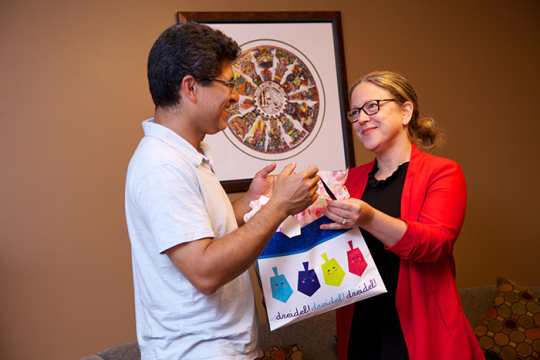
I met Shoshanna* in the hospital during the last days of her life. At the age of eighty, she suffered a stroke that left her partly paralyzed. Her life, she confided, had been filled with longings and disappointments. She'd been chronically depressed, trapped by the emotional and physical abuse she had experienced as a child. She also felt bereft of any connection to God. Now, knowing that she was dying, she told me she was terrified - of the finality of death, or, if God did exist, of God's punishment for her lack of faith.
I tried to comfort her. "In Judaism we believe that God can receive and absorb anger and disappointment and respond with love rather than with punishment," I explained. "The words of our prayers and psalms assert that God eagerly awaits our return and is a source of eternal and generous forgiveness."
"I wish other rabbis had spoken about God in this way to me," she said, remembering how, as a little girl, she used to recite to herself words of love she wished her parents would have said to her.
"Did you ever imagine God as that parent who could cherish and nurture you?" I asked.
"No one ever spoke of such a God. If only they had..."
Only in her final days was Shoshanna ready to contemplate a loving God.
Why God Matters
In truth, all of us will pass through seasons of pain and loneliness. For many of us, sustaining the image of a caring God can help us through our darkest hours. And oftentimes the earlier we find our God image--especially in childhood--the more supported we will be. When children experience conflict with parents or a death in the family, they can find solace in an Empathic Presence. And many who turn to God come to feel a greater sense of autonomy, realizing that their parents are not the only source of judgment or power, and that they themselves possess the spiritual means to cope with the challenges in their lives.
The Spiritual Lives of Children
Children are more open to ideas about God than many of us realize. We tend "to presume that adults are the serious God seekers and children are the empty vessels into which those older and wiser must pour a religious spirit," says Rabbi Sandy Eisenberg Sasso. "In truth, children already have a deep spiritual life, and the role of teachers and parents is to help them give expression to what is already inside."
The tendency toward spirituality is universal, transcending cultures. Human beings seem to be "wired" with the potential to express wonderment and seek a relationship with a transcendent being long before any introduction to organized religion. Children whisper secrets to an ever-understanding God; ask God to help them solve problems; and petition God to protect the family, friends, and animals they love.
The Doubting Parent
Nonetheless, many parents who truly want what's best for their children have trouble talking to them about God. Oftentimes such parents have wanted to believe in God themselves, and transfer their disappointment and frustration of their own search to their children. As one father said to me, "It's far easier for me to introduce Barney (a popular children's television character) to my kids than to mention God. I would like to believe, but I have profound doubts. Since I have no real belief in Barney, there's no source of conflict. But when it comes to talking about God, I feel like a hypocrite."
"Our own adult questions about God do not have to be resolved before introducing helpful ideas about God to our children," I responded gently. "We introduce our children to hopes about world peace although we don't know how to achieve it. Spiritual feelings, by their very nature, cannot be understood through rational means. And speaking to our children of subjects about which we are uncertain does not make us hypocrites."
Most parents comfortably tell their children stories they know not to be literally true, but which nevertheless convey important truths. Consider the father who, while tucking his son in for the night, tells him the tale of the lion who becomes ensnared in a trap and is rescued by a mouse who gnaws through the ropes; the newly freed lion now expresses his gratitude and the newfound belief that even a little mouse can do something miraculous. At the end of the story the son smiles dreamily and nods off to sleep, feeling more certain that a small fellow can make a big difference. The father does not worry that he is telling his child a fable. He does not feel compelled to discuss with the child whether lions and mice can talk or whether they ever engage in altruistic acts. So, too, the rich legacy of Jewish stories drawn from the Bible and other sources can be shared with children without our needing to clarify what is literally true and not true.
Similarly, many parents are quite comfortable participating in secular childhood rituals that embrace magic. Children tuck their baby teeth under the pillow and, sure enough, a gift from "the tooth fairy" miraculously arrives in the night to be discovered by the child in the morning. To celebrate a child's birthday, parents light birthday cake candles and encourage the child to make a wish. Few parents will quash a child's hope that their wish will come true.
When it comes to God, however, the same adults who happily encourage their child's belief that birthday wishes can come true may dismiss their child's belief in the power of prayer. "Eventually the kids will find out that we are the tooth fairy," one man told me. "I don't mind if my kids believe in magic that we can eventually show them came from the loving devotion of relatives--but what happens when they find out, as they will, that believing in God doesn't mean that everything they want will come true--there will still be wars and hunger. Won't we have kind of lied to them? Won't they be disillusioned--in God and in us?"
"Ideas and beliefs about God's power and role evolve," I explained, "just as our ideas about our parents do. Older children and adolescents don't feel they were lied to because when they were small their parents allowed them to believe that mommy or daddy kept them from all harm. Nor do older children lose all faith when they finally recognize the fallibility of their parents. So, too, many of us can sustain a loving relationship with God even when we find God is not the figure we imagined in childhood."
In this regard, I believe we also can take comfort in the findings of psychoanalyst and psychiatrist Ana Marie Rizutto (The Birth of the Living God, 1981), who discovered that a person's evolving views of God parallel an increasingly nuanced view of other important figures in their life. The small child may conceive of a God similar to his own parents--possessing great power and authority (including the ability to punish) and being a source of nurturance. The school-age child may see God as a source of rules and organization. The adolescent may view God as an authority figure against whom to rebel. Gradually, God may come to be viewed less as an omnipotent external force and more as a wellspring of meaning, values, and comfort.
What our children believe about God will undoubtedly change as they grow older. So why not allow our children their God stories and hopes and dreams?
Parents without Answers
Some parents choose not to speak to their children about God because, as one mother told me, "I just don't know what to say; I'm unsure of my own beliefs. Last week my daughter asked me, 'Mommy, is there really a God?' and I changed the subject. I realized my answer might have a lasting impact on my child, and I didn't want to say the wrong thing."
The first step, I advised, is to consider whether your child is really seeking an answer to that question. She may instead want to know how secure her world is. She might be asking: "Is there really someone in charge of the world? Is there order in the universe? Am I safe?" Sometimes, if we answer the God question as it is asked, we may cut off meaningful conversation.
Once you have considered the context of the question, you may wish to reframe what your child has said. For example, if your child asks, "Daddy, is there really a God?" after the death of a grandparent, you might say, "It's hard to understand how a God who loves us could allow Grandpa to die." Or you could ask, "Are you feeling very sad about Grandpa dying and wondering how this could happen?"
You may also wish to turn the original question around and ask your child what they think about God. If it seems right, you can give your child permission to doubt and question, reminding him or her that the Hebrew word "Israel" means "God-wrestler."
Approaches to God
As we enter into discussions about God with our children, it is good to keep these thoughts in mind:
In general, it is best to allow your children to develop their own ideas about God. Both the theologian Martin Buber and the pediatrician and psychoanalyst D. W. Winnicott advise that for children to truly derive comfort and meaning from their religious lives, they must be able to make spiritual discoveries on their own, rather than only be taught about the moments of religious revelation experienced by others.
It's often better not to be heavy-handed in encouraging or discouraging specific religious ideas or God concepts, regardless of how fanciful they seem to you. Vocalizing strong opinions may have the unintended consequence of deadening the innate spiritual life of a child. Later on, your child will bring their own ideas into the shared pool of ideas and traditions that are our Jewish spiritual and cultural heritage.
It's best to allow varied ideas about God to be a natural part of your child's world, left around to be explored much as parents leave out toys for a child to discover. Just as most children will form an attachment to a blanket or bear, which they have endowed with feelings of comfort associated with the child's own creativity and familial memories, children can find a soothing idea of God imbued with their own creativity and loving memories. In time, the child's connection to a teddy bear or blanket will wane, but the ability to find comfort and connection in the symbolic realm will remain into adulthood.
To offer your child spiritual possibilities, wonder aloud about the idea of God as protector or parent. Suggest that God may be the Source of life. Some parents have proposed that their children add the letter "o" and imagine God as the G(o)od(ness) in our universe and in our hearts. This imagining can be especially helpful to parents who, when later confronted with the questions, "is God real, can God make things happen?" can answer, "Yes, if we think of God as G(o)od(ness). G(o)od(ness) can guide us and G(o)od(ness) is everywhere. It resides within each of us, and we can also turn to the G(o)od(ness) in others."
Stress the playful, the magical, and the creative. Parents who read secular stories to their children can also read Bible stories and sing Jewish songs that include God. These need not be seen as "religious education"--in fact, books with heavy-handed moral messages are less valuable than those which stress wonder, miracle, and possibility. You might also invent a unique family ritual in which God gets to play a leading role.
Do not be concerned that these ideas will stifle your child's own God concept. If ideas about God are introduced gently, those that are of use to your child will be embraced and those which are not will be ignored. Most times, a child will feel as if they have made an original discovery.
The psychologist Erik Erikson noted that the most important achievement in any child's development is the ability to possess a sense of basic trust in the world, which usually evolves from the secure experience of being well cared for by one's parents. Religion and belief in God can be important ways to support this trust, he said, for they instill in us the belief that although adversity and loss may be part of life, we can count on finding sources of goodness and love within our world that will enable us to prevail.
Talking about and encouraging our children to speak about God--whether it is the God in whom they believe or the God in whom they wish they could believe--we are offered a glimpse into their hearts, and an opportunity to help sustain them for the remainder of their lives.
Related Posts

Melding Tradition and Innovation: Our Interfaith Toddler Naming Ceremony

Nine Spring-Inspired Hebrew Names

